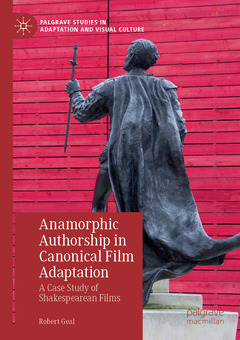Description
Anamorphic Authorship in Canonical Film Adaptation, 1st ed. 2019
A Case Study of Shakespearean Films
Palgrave Studies in Adaptation and Visual Culture Series
Author: Geal Robert
Language: English
Subjects for Anamorphic Authorship in Canonical Film Adaptation:
Keywords
Shakespeare; play; theatre; cinema; original; author; dialogic; psychoanalysis; poststructuralist; Barthesian; Bakhtinian; Benvenistene; foreknowledge; diegetic
Publication date: 08-2020
Support: Print on demand
Approximative price 79.11 €
In Print (Delivery period: 15 days).
Add to cartPublication date: 06-2019
247 p. · 14.8x21 cm · Hardback
Description
/li>Contents
/li>Biography
/li>Comment
/li>
This book develops a new approach for the study of films adapted from canonical ?originals? such as Shakespeare?s plays. Departing from the current consensus that adaptation is a heightened example of how all texts inform and are informed by other texts, this book instead argues that film adaptations of canonical works extend cinema?s inherent mystification and concealment of its own artifice. Film adaptation consistently manipulates and obfuscates its traces of ?original? authorial enunciation, and oscillates between overtly authored articulation and seemingly un-authored unfolding. To analyse this process, the book moves from a dialogic to a psychoanalytic poststructuralist account of film adaptations of Shakespeare?s plays. The differences between these rival approaches to adaptation are explored in depth in the first part of the book, while the second part constructs a taxonomy of the various ways in which authorial signs are simultaneously foregrounded and concealed in adaptation?s anamorphic drama of authorship.
These books may interest you

Shakespeare / Not Shakespeare 116.04 €

Shakespeare / Not Shakespeare 116.04 €


